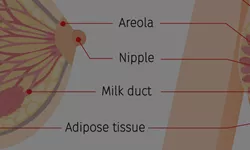This article is part of a series on breast milk's nutrition facts.
What are breast milk's nutrition facts?
Q: What is breastmilk composed of? Is it the equivalent of a meal with carbohydrates, proteins and fats? Or is less balanced?
A: Breast milk is, unsurprisingly, composed mostly of water at about 87%.

Breast milk's composition
The second biggest element is carbohydrates, mostly lactose, which make up roughly 7.5% of your breast milk. Carbohydrates alone account for about 40% of your milk's calories count.
Then we have fats which, although they only make up 4.4% of your breast milk, account for 60% of its calories!
Lastly we have 1.1% of proteins as well as small but crucial amounts of minerals and vitamins like Vitamin A, Vitamin C, Calcium, Iron, Vitamin D, Vitamin B, Cobalamin, Magnesium iodine, etc.
We also have other important elements such as antibodies which help your little one's immune system fight diseases. When you breastfeed, your body gets messages from your little one's immune system regarding which attacks it's currently facing. It responds by filling your breastmilk with the antibodies your baby needs from you. It's as if your baby's body was ordering weapons and your body was fulfilling the order! This is by the way one of the greatest advantages of breastfeeding versus formula.
Of course, the exact composition of breast milk varies quite a lot depending on the mother's diet and the environment. For instance Indian mothers' breast milk seems to have less fat as a percentage than that of American mothers1. This might be due to their traditional vegetarian diet.
Breast milk's composition is not static. It constantly evolves according to the baby's growth, the external environment and the baby's immune system requirements. Colostrum for instance, the very first milk you express for your newborn, will have an extremely high amount of beta-carotenes (10 times more than mature breast milk) because that's what your baby needs at that moment.
Your milk's nutritional value is not only about how much fat, carbs and proteins it contains. The quality of those elements also matter a lot. To learn more about that, read more about fat in breast milk here, proteins in breast milk and carbohydrates in breast milk.
To improve the nutritional value of your milk, we also recommend you drink Milk Boost Tea. It's an ancestral recipe of 13 natural herbs that's been used for centuries. And since it's only made of herbs, it contains zero calories so you can drink it guilt-free.

Milk Boost Tea is a natural herbal tea that can help you improve your milk volume and its nutritional value
Among its 13 ingredients Milk Boost Tea contains Dong Quai, a root also known as the "female ginseng" for its wide range of health benefits for women. It also contains Longans, famous for nourishing the blood and helping nursing women recover from childbirth.
You might also be interested by the other articles in our series about breast milk's nutrition facts:
- How many calories are there in breast milk?
- Why is fat so important in breast milk?
- Are colostrum's nutrition facts the same as breast milk?
- Does formula have more calories than breast milk?
- How much proteins are there in breast milk?
- How much carbohydrates are there in breast milk?
Sources:
1. Hester SN, Hustead DS, Mackey AD, Singhal A, and Marriage BJ. 2012. Is the macronutrient intake of formula-fed infants greater than breast-fed infants in early infancy? Journal of Nutrition and Metabolism: 891201.
Article tags: Breastfeeding and maternity








